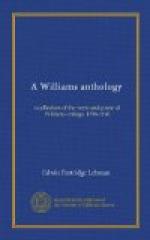Student—“Bill, what do you think of the constitutionality of the configuration, esthetically considered?”
No reply is elicited from Bill, but a scornful “Ottah,” as he puts on a new stick and continues his work.
Student, (not discouraged)—“Really, Bill, I should like your opinion on that point.”
Bill, (having finished his stick)—“You ain’t no kind of a man. You hain’t got no elements, no justice of earth. When I see these young men and the monument of liberty imported from Long Island for the benefit of the rising generation, Ottah! Rolling Ottah!! Rang Dang! Du Dah!!!”
Of course a rebuke so scathing and sudden as this, never fails to annihilate its object. Being assured by the rapturous applause which ever succeeds his efforts, that he has made a good hit, Bill suddenly becomes as impenetrable as Gibraltar, and saws vigorously.
If, at a time like this, “the Professor,” alias “Niobe,” having snatched a few moments from his professional perambulations in search of “Coffee,” steps forward, signalizing his debut with the interrogatory: “Do ye think I’m a common laborin’ man?” naught is wanting to complete the student’s bliss.
“The Professor” is by no means as varied in his accomplishments as Bill, his only quotable utterances being the one already given and another, supposed to be severely sarcastic: “How lang has he been so?” He, however, has, in the recesses of his brain, a dim idea that Bill is weak, viewed from an intellectual standpoint, while Bill has an equally indistinct belief that “the Professor” has very little furniture in his upper story. How far either of them is wrong our space does not permit us to say. Both have a supreme contempt for students, regarding them as effeminate cumberers of the ground. In the presence of Bill, “the Professor” does not appear to advantage. Being entirely unable to compete with him in a war of words, he is usually forced to betake himself to dancing; which, compared with oratory, is frivolous.
Occasionally the adversities of life seem to press upon Bill with peculiar force, rendering him extremely dejected. At such times, though his flow of language does not forsake him, he is without that cheerful aspect and spontaneous expression ordinarily so characteristic. No longer does he cause the campus to ring with his hearty vociferation, but he grumbles very like an ordinary mortal:
“I tell yer now I don’t believe no man ever got rich sawin’ wood. I tell yer it’s hard work to saw wood all day and car’ it up two pa’r stairs on yer back. I’ve sawed wood mor’n thirty years. You ask Mist’r Tatlock, if yer don’t believe it. Mist’r Tatlock’s nice man. There ain’t no temptations about him. I sawed last night till twel’ o’clock, an’ it’s hard work. Say, that feller up in that room gin eight dollars for that cord o’ wood, an’ it ain’t good for nothin’. It’s all full o’ the Ottahs in the lucination of the veins.”




